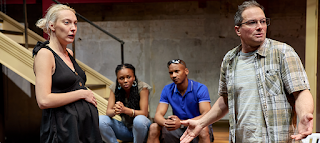Hansberry's play sees the first black family move into a middle-class white neighbourhood; Norris' two acts function as prequel and sequel to that event, beginning in the 1950s when Bev (Imogen Stubbs) and Russ (Richard Lintern) are preparing to move out of their house.
Russ has been promoted to a different office and they're moving to a more convenient commute, but they're also escaping the memories of their Korean War veteran son, who committed suicide in the house. So it's a particularly stressful move that's especially affected Russ, who's all but shut down. Not that this stops their neighbour Karl (Andrew Langtree,) who arrives with his own urgent concern: He's learnt that the house has been bought by a black family, and desperately wants to find a way to prevent them from moving in. In front of black maid Francine (Aliyah Odoffin) and her husband Albert (Eric Underwood), he happily exposes his own racism, and also inadvertently the shortcomings of the supposed community he's trying to preserve.
It's a strong first act, often funny, always near the knuckle (Katie Matsell as Karl's deaf wife Betsy has a great, tension-breaking visual gag) but it's always inevitably overshadowed by the breathlessness of the second, set in 2009: Clybourne Park has indeed become a predominantly black neighbourhood, and after decades of social ups and downs is now being eyed for gentrification. White couple Steve (Langtree) and Lindsay (Matsell) have bought the house and are planning an extensive remodelling, which has to be approved by the residents' committee, represented by Kevin (Underwood) and Lena (Odoffin.) They're joined by lawyers Kathy (Stubbs) and Tom (Michael Fox,) who keeps asking for the meeting to stick to schedule but also keeps getting interrupted by calls.
It's Lena who's trying to make a point about her fears that the neighbourhood's history and heritage won't be preserved if sweeping changes are approved; Steve interprets this as her worrying that the historically black neighbourhood will be overrun by white people*. The ensuing argument leads to the play's most famously incendiary and funny scene, as Steve and Kevin exchange racist jokes in a supremely passive-aggressive attempt to prove they're "post-racial" and not easily offended.
A lot can change in twelve years (this was originally meant to be a tenth-anniversary production but you know the rest,) and while some of the concerns may seem trivial in terms of what we've actually seen happen around the world, other elements seem prescient: The character of Steve himself might be tame compared to some of the very real racial hatred we've seen leading up to and in response to BLM, but as a microcosm of white America there's definitely something familiar about a surface layer of liberalism under which there's an explosive level of tension, in part provoked by the fact of one in 44 Presidents not being white seeming like a loss of power (Colin J Smith's video design opens each act by projecting all the US Presidents up to that point onto the back of James Turner's set design, reminding us of the play's origins in Obama's first term.)
Turner's design is similar to how I remember the original production looking (the almost farcical elements of the comedy mean there's a lot of set elements that can't really vary too much,) and Kaderbhai's production doesn't try to reinvent the wheel either. Which is wise, as in order to get away with its frequent line-crossing the cast has to get the comedy beats pitch-perfect so that's where all the focus needs to go. And it pays off in a uniformly excellent cast: Langtree gives two very different versions of men outwardly showing their era's idea of "respectability" while letting their own insecurities poison themselves and everyone around them; Stubbs' Kathy is so used to being the centre of any conversation she consistently misses the point of this one; Odoffin's little fake gesture of shock after the play's most infamous line is a joy. I was worried about a former ballet dancer having to step into Lucian Msamati's shoes in his first-ever acting role, but Underwood gives Kevin a quiet dignity and strength that contrasts with his wife's more fiery anger.
Giving a light touch to matters that were heavy at the time, and have only got heavier in the intervening dozen years, Clybourne Park gives us thoughtful comic drama in the first act and broader comedy in the second, making it one of the least respectful ways you could possibly approach the subject of racial tensions, but also one of the most accessible. They may not be the exact same questions as when it debuted, but it still demands that questions be asked, and by being so relentlessly entertaining it makes them harder to look away from.
Clybourne Park by Bruce Norris is booking until the 23rd of April at Park Theatre 200.
Running time: 2 hours 20 minutes including interval.
Photo credit: Mark Douet.
*something I spotted on Clybourne Park's Wikipedia page that puts Lena's point in a bit more context: The house is based on the one Hansberry's mother bought in real life, and which at the time the play premiered was being considered for Historical Landmark status, in contrast to its fictional equivalent being about to be demolished







No comments:
Post a Comment